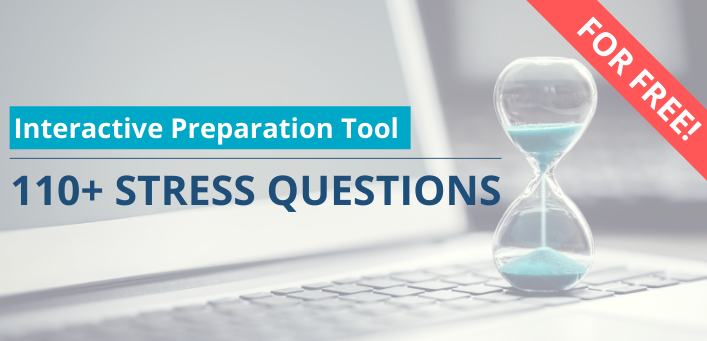The preparation for your case interview in management consulting requires a lot of work, diligence, perseverance, and discipline. It is not uncommon for many candidates to focus on the case interview itself, without keeping the motivational fit interview in mind. Even if it makes up the smaller part of the interview, it is still equally important in the interviewer's decision as to your case-solving. Within this article, our case interview coach Clara gives you an introduction to the most common motivational fit questions and provides you with a fitting approach to answer them.


Motivational Fit Interview Questions – Tips for Your Case Interview
In consulting interviews candidates will usually face two or three on-site rounds of interviews with consultants. This series of 3 expert articles, focused on the preparation of the FIT part, will provide guidance to prepare the initial part of those in-person interviews –of which, normally, the initial 15` will be dedicated to.
These are the other articles of the series:
(1) Intro - and CV questions
(2) Behavioral Interview Questions
Although many candidates underestimate FIT and focus their preparation on business cases, FIT is as important to be prepared as business cases. In consulting interviews, FIT is an in-depth assessment of your skillset, not a standard motivational interview.
The importance of the FIT interview derives from the job description and required skillset of a consultant, not limited to analytical and problem-solving skills, but also encompassing team and client management abilities. These last two cannot be tested through business cases, hence the importance of FIT.
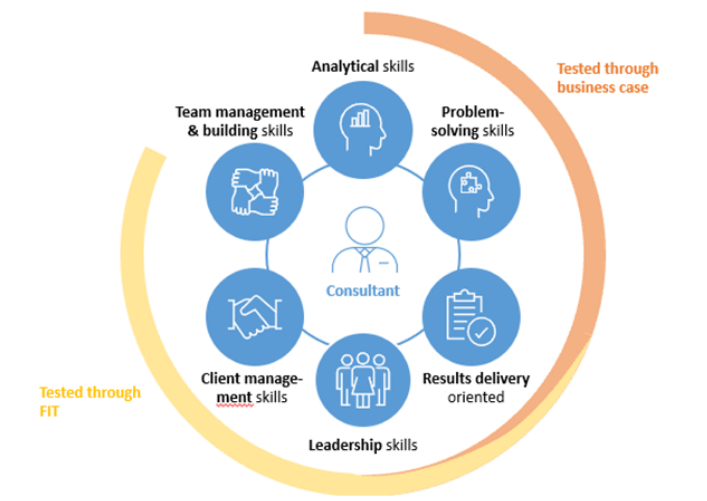
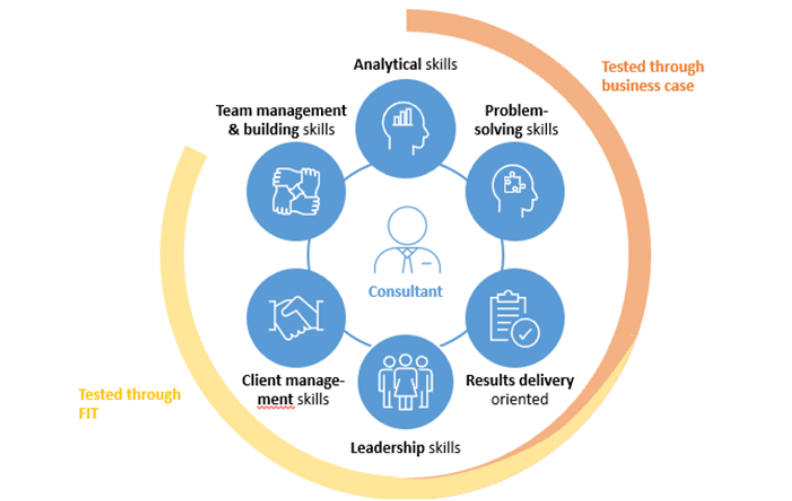
Motivational questions are aimed at understanding the candidate's drivers for the application, in concrete:
- Why consulting: particularly relevant for candidates transitioning from other jobs or graduates coming from less-usual study paths
- Why this MBB (McKinsey, Bain, BGG): what makes you apply to this particular firm, what is the special value proposition to you?
- Why this particular location: particularly relevant to people re-locating
- Why this particular specialized business function: only relevant when not applying for a general role (e.g., McKinsey Advanced Analytics, BCG Gamma, etc.)
Furthermore, keep in mind that consultants themselves -and not HR- conduct the interviews. While listening to the answers, and on top of the key criteria that they must evaluate, they would always keep in mind the following questions:
- Can I work with this candidate closely in a team every day? (Even when doing 100h/week)
- Can I send the candidate to a client alone?
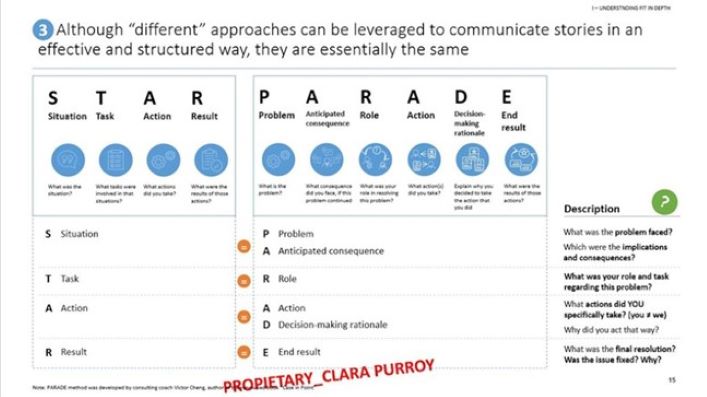
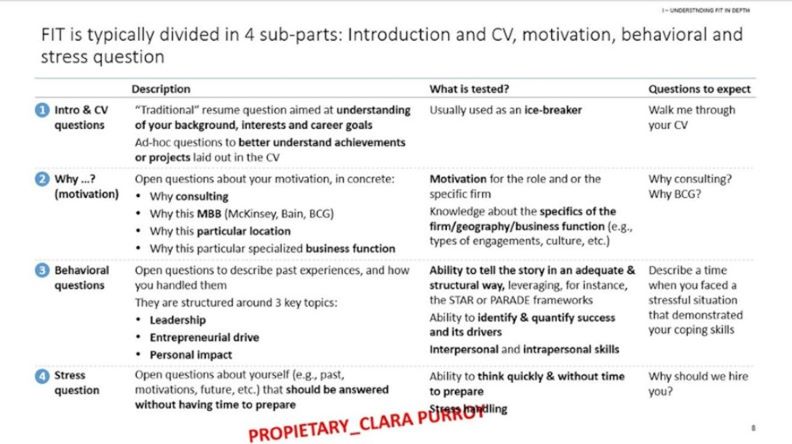
2.1 What are the Interviewer's Goals With These Questions?
What the interviewer is trying to assess, for each of the four classical motivational questions, is the following:
- Why consulting:
- Are you knowledgeable and motivated enough for this endeavor?
- Why this MBB (McKinsey, Bain, BCG):
- Have you researched enough to state what makes this company special, and how does appeal to you particularly?
- Why this particular location:
- Do you have a strong value proposition in the target geography, enough to make you stay for a few years?
- Why not stay in the office in your home country/city?
- Why this particular specialized business function:
- Are you knowledgeable about the function itself?
- Do you have relevant past experience with it?
2.2 Which Communications Techniques Can Be Leveraged?
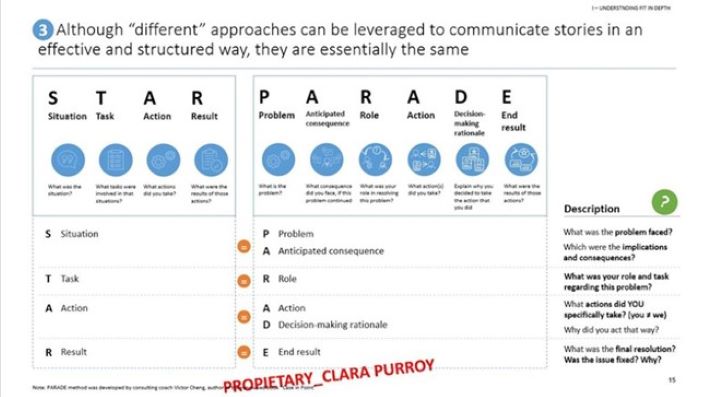
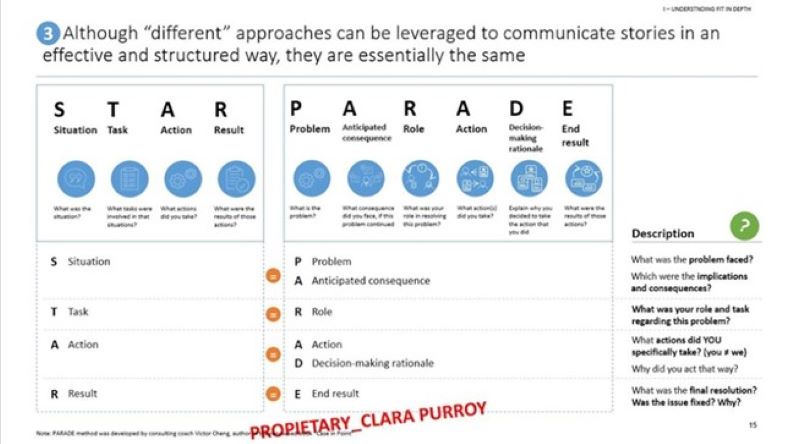
STAR or PARADE methodologies are “different” approaches/techniques that can be leveraged to communicate stories in an effective and structured way.
STAR stands for:
Situation→ Task → Action → Result.
PARADE is similar to that just enhanced and modified with further aspects to have a look at:
Problem → Anticipated Consequence → Role → Action → Decision-Making Rationale → End Result
By using these communications techniques, you are able to structure your answer efficiently without wasting your time jumping from one thought to another. When using the STAR/PARADE methodology, you answer your interviewer’s question by starting with the problem you faced as well as with the implications and consequences that followed along.
After that, you describe your role and task regarding this problem. Most importantly, you will then describe the specific actions you took to solve the problem. Finally, in the last part of your answer, following those methodologies, you will come to the final resolution and should tell the interviewer if the problem at hand has been fixed or not, of course, accompanied by an explanation.
➥ Graphs from the Integrated FIT Guide for MBB
3.1 Why Consulting
Hints:
- In most cases, there is more than one reason. Write your ideas, in order of importance, in bullets points
- Start your answer with an introduction to those bullet points (e.g., There are mainly 3 reasons why I would like to work in consulting)
- Comment on the bullets in order or importance, clearly separating the ideas. This makes it easier to follow, more structured, and dynamic
- Finish with a summary of the points, as long as a “tweet” (e.g., In a nutshell, the 3 reasons why I want to work in consulting are the multidisciplinary approach, global scope, and client-facing engagements)
Short example:
There are two main reasons why consulting is the way that I want to start my career. I studied Architecture since I loved the multi-multidisciplinary approach: from Math to History, from Construction to Aesthetics. However, I realized that, when it comes to working as an architect, the scope narrows down a lot. Hence, the 1st reason why I want to transition to consulting is to keep the multi-discipline and multi-industry focus. Furthermore, I love being constantly challenged and learning at high speed, and I know that consulting has one of the steepest learning curves. In a nutshell, the 2 reasons why I would like to join consulting are the multi-disciplinary focus and the constant challenge that drives exponential growth.
3.2 Why This Particular MBB
Hints:
- *Points from question 1 also apply
- Prepare specific 2-3 reasons that make this firm special. Some resources to leverage are:
- Web pages: align with the company values, mission, and vision
- Recruiting events: not only at educational centers but also in job fairs or ad-hoc sessions (e.g., McKinsey Next Generation of Women Leaders)
- Research the focus of that particular office by seeing the profiles and publications of its members (e.g., leveraging LinkedIn)
- When you know someone from the firm, mention that this person helped you gain an even deeper understanding of the firm and made it more attractive
Short example:
Bain is my target company mainly due to its focus on Private Equity. As my prior experience demonstrates, I am passionate about the topic and I want to keep learning, from the best, about it. Furthermore, I admire the company´s culture, with a stronger focus on employees than on other MBBs. I am close friends with John Smith, from the London office, who has told me all about the office activities on Fridays, retreats, and helping culture, which sounds wonderful to me. Finally, it would be an honor to belong to Bain´s alumni network – which John has told me works like a “bigger family” – that delivers impact in multiple industries atm. In sum, the three main reasons why I would like to join Bain are its focus on PE, its culture, and its incredible alumni community.
3.3 Why This Particular Location
Hints:
- *Points from question 1 also apply
- Research the focus of that particular office (e.g., types of projects, types of clients, etc.), since this is what makes it special
- Outline personal reasons if they exist, but don't limit your answer to them
Short example:
There are two main reasons why I want to join McKinsey in UAE. First of all, I know it has a higher focus on Public Sector engagements than the European offices, a topic that not only passionates me but also would be a continuation of my previous work experience. Secondly, my husband and I are going to move abroad for some years before starting a family, and we have agreed to look for opportunities in this region, where we have a lot of friends and family. Hence, the McKinsey office in Dubai would be a perfect choice.
3.4 Why This Particular Business Function
Hints:
- Learn in-depth the job description of the business function, and outline the difference between that path vs. a general consultant path
- Prepare detailed answers to the following questions:
- What makes this particular business function in this firm special? (e.g., compared to similar business functions in other MBBs)
- Why not apply for a generalist role?
Short example:
I decided to pursue a master's in Big Data and Analytics since I am truly convinced that leveraging data to solve business issues is one of the best approaches, and most followed by companies now and in the future. Hence, McKinsey Advanced Analytics seems like the perfect fit for me, since I would contribute to the team with my analytical capabilities, as well as develop further my business knowledge. The value proposition, in the intersection of business and analytics, is the most appealing to me.
If you have come this far in the article, that’s great! You have already collected a lot of valuable information on how to crack a behavioral interview. You can check the other two articles in the FIT preparation series here: behavioral questions and CV questions. For even more insights, you may also want to check out our free Case Interview Basics article on the personal fit interview. If you still have questions after that, feel free to ask them in our Consulting Q&A, our experienced coaches are happy to share their personal experiences and have valuable tips for you at hand!
Your next step will be to take the theoretical knowledge you have gained and put it into action! On PrepLounge, you can practice interviews with other case partners who cannot only test your case-solving skills but also your performance in answering behavioral interview questions. Thus, make sure you propose a practice session on our Meeting Board to receive helpful feedback on your stories. Further, you can make use of our interactive Stress Question tool. Here you can go through more than 110 possible questions that could come up during the personal fit part of your interview.
Finally, we would like to recommend Clara’s Integrated FIT Guide to you. It provides an end-to-end preparation for all three MBB interviews, as well as other consulting interviews, combining key concepts review and a hands-on methodology. Following the guide, you will prepare your stories by practicing with over 50 real questions and leveraging special frameworks and worksheets that guide you step-by-step. Finally, as further guidance, the guide encompasses over 20 examples from real candidates.
Make sure to give yourself the best FIT interview preparation and leave no stone unturned to land your dream job in management consulting. Do not wait and start directly with your preparation!
5. About the Author
McKinsey | Awarded professor at Master in Management @ IE | MBA at MIT |+180 students coached | Integrated FIT Guide author
- Professional Experience: Instituto de Empresa Business School, Amazon, McKinsey & Company
- Languages: English, French, Italian, Spanish
- Location: Spain
Clara started her career in McKinsey & Company, where she focused on Telco, Oil & Gas, and Real Estate. She later joined the team that launched Amazon Business in Spain, where she is nowadays in charge of several capability-building and coaching programs for the Spanish Marketplace department.
Clara teaches “Data Insights and Visualization” in the Master in Management at Instituto de Empresa in Madrid, where she has received the Teaching Excellence Award, as the best-valued course by the students. She has also coached 150+ candidates on diverse platforms, such as PrepLounge. Furthermore, she is the founder and president of the NGO Building their Future since 2015, focused on educational projects in Nairobi, Kenya.
Continue to Learn





